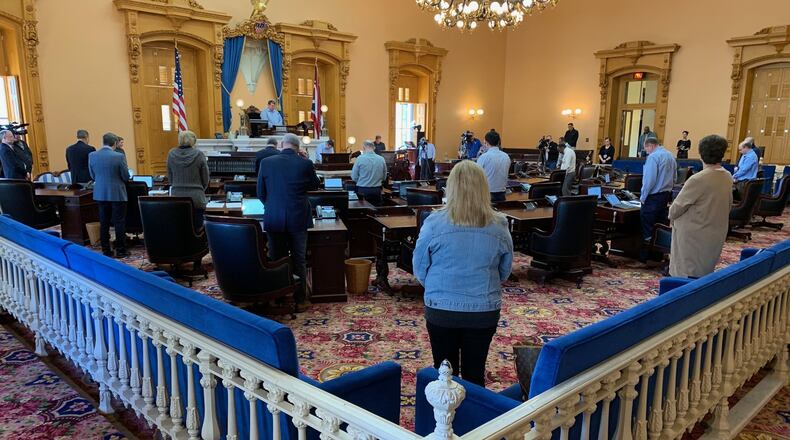CORONARIVUS: Complete coverage from the Dayton Daily News
The bill cleared the Ohio Senate and Ohio House on unanimous votes. It’ll take effect immediately when Gov. Mike DeWine signs it into law.
Overall, the bill addresses more than two dozen issues linked to the coronavirus crisis. Here is a rundown:
ELECTION: Mail-in voting for the postponed March 17 primary will be extended to April 28 and no in-person voting will be held; pension boards will be allowed to delay election of trustees; county central committees will be given an extra 45 days to fill vacancies.
RELATED: Ohio election suspension delays tax issue results
EDUCATION: Exempts schools and others from food processing requirements so student meals can be delivered; permits school districts to use distance learning to make up for lost hours; allows specia- education providers to use telehealth to deliver services; lets seniors graduate high school as long as they were on track to do so before the crisis hit; allows the state to waive College Credit Plus time lines; puts a freeze on EdChoice voucher eligibility criteria for a year.
Coronavirus: Closed schools scramble to help kids learn online
HUMAN SERVICES: Prohibits water disconnections; suspends child-to-staff ratio requirements for daycare centers that remain open; and allows the state to continue payments to publicly subsidized child care providers so they're able to quickly return to service.
HEALTH CARE: Gives the Ohio Medicaid director flexibility to support the health care workforce; allows recent nursing school graduates to obtain temporary licenses before passing license exams; expands the scope of practice for certified registered nurse anesthetists.
DETAILS: Coronavirus: Small businesses meet huge need for face masks
GOVERNMENT OPERATIONS: It'll allow public bodies to meet electronically as long as the public is given notice and a mechanism to participate; allows public pension boards to delay election of trustees; lets state government re-hire recent retirees for key departments, such as prisons; allows transfer of cash out of the state's rainy-day fund with Controlling Board and at least two votes from each legislative chamber.
OTHER: Extends the validity of licenses issued by state agencies and local governments by 90 days; puts into law Gov. Mike DeWine's changes to the unemployment compensation system, including waiving the one-week waiting period and the work search requirement; and extends the state income tax filing deadline to July 15.
Most of the changes are temporary and expire either Dec. 1 or 90 days after the COVID-19 emergency ends.
Ohio Department of Health Director Dr. Amy Acton issued an order shutting down Ohio’s 3,600 polling places for the March 17 primary to reduce the spread of coronavirus. Secretary of State Frank LaRose issued a directive to reschedule the primary for June 2, but his authority to do so has been challenged in court.
On Wednesday, the ACLU of Ohio, League of Women Voters of Ohio, Common Cause Ohio and other voting-rights groups told legislative leaders they oppose the plan to extend mail-in voting to April 28.
The groups said there should be options for in-person voting at least through mid-May, pre-paid postage for returning ballots, and extended voter registration.
Lt. Gov. Jon Husted, a former legislator and Secretary of State, said a longer window for continued voting would have been preferred. “We will make the best of it,” he said.
Legislative leaders took steps while working on the legislation to minimize the potential spread of coronavirus: House members were staged in smaller groups around the Ohio Statehouse and called into the House chamber for voice votes, while non-essential staff were told to work from home.
Jobs impact: Coronavirus layoffs begin in earnest across Ohio
State senators were encouraged to ditch their dry-clean-only suits for casual wear that is laundered more frequently; senators were strongly encouraged to stay home if they’re ill, a family member is ill, or lives with a pre-existing condition; and anyone in contact with someone who tested positive for COVID-19 was ordered to stay home.
Members of the press were allowed to attend the Senate session, but three pool journalists for the Ohio Legislative Correspondents Association, founded in 1893, were the only media permitted inside the House chamber.
About the Author

